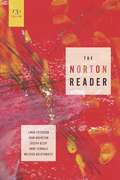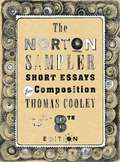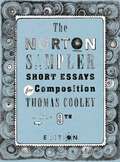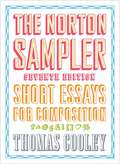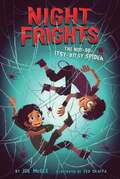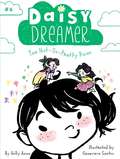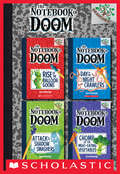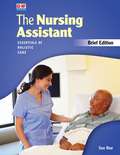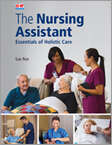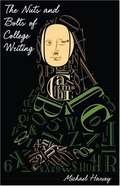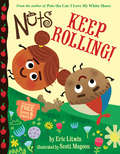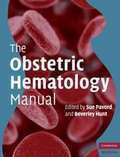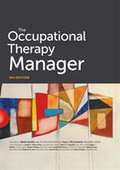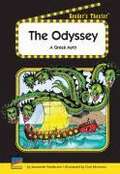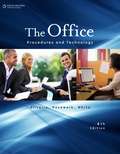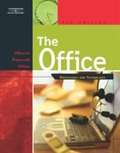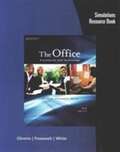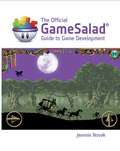- Table View
- List View
The Norton Reader: An Anthology of Nonfiction (13th Edition)
by Linda H. Peterson John C. Brereton Joseph Bizup Anne E. Fernald Melissa A. GoldthwaiteThe Norton Reader began as an attempt to introduce students to the essay as a genre, and to create an anthology of excellent nonfiction writing. This new edition offers a wide selection of essays on a broad range of subjects--from Jhumpa Lahiri recalling the town in Rhode Island where she grew up to Peter Singer contemplating how much billionaires should give, to Rita Dove meditating on her religious heritage.
The Norton Sampler
by Thomas CooleyWith 71 readings (half new to this edition), well-written writing instruction (including templates to help students get started), and new navigation features that make it very easy to use, The Norton Sampler is a rhetorically arranged reader that practices what it preaches about good writing.
The Norton Sampler: Short Essays for Composition
by Thomas CooleyA trusted and engaging collection of 65 short essays, both classic and contemporary. All are arranged by rhetorical pattern, with practical instruction on how to write an essay. <p><p>The Ninth Edition has a brand-new design, 22 NEW readings, a NEW chapter on the elements of the essay, and the most easy-to-use organization of any reader of its kind.
The Norton Sampler: Short Essays for Composition (7th Edition)
by Thomas CooleyThe Norton Sampler is a rhetorically arranged short-essay reader that provides models and guidelines for writing description, narration, and all the other modes of discourse. The readings are brief, reflecting the length of the essays students are required to write. From classic texts by writers such as Annie Dillard and E. B. White, to contemporary texts from writers like Barack Obama and Marjorie Agosín, The Norton Sampler includes a range of readings that will delight teachers and engage students. Texts from a range of everyday media-from billboards to coffee mugs-demonstrate that the rhetorical modes play an important role in all the writing and reading that we do. Now with enough writing instruction that students will not need a separate rhetoric.
The Not-So-Itsy-Bitsy Spider (Night Frights #3)
by Joe McGeeIn this third installment in the spooky and silly series that&’s perfect for fans of Goosebumps and Scary Stories to Tell in the Dark, a kid home alone faces off against a giant spider!Wolver Hollow is not a normal town. The adults are too busy shuffling off to work at the old coffin factory to notice or care, but the kids know all about monsters, ghosts, and strange lights in the sky. Strange things happen in Wolver Hollow. Creepy things. Adults are always telling kids that spiders are more afraid of them than they are of the spider. But what about when that spider is the size of a dog? And your parents are out? And you just saw it scuttle past the open doorway to the living room? You know it&’s waiting to jump out and eat you. You have no choice…you have to find it before it finds you!
The Not-So-Pretty Pixies: Daisy Dreamer And The Totally True Imaginary Friend; Daisy Dreamer And The World Of Make-believe; Sparkle Fairies And The Imaginaries; The Not-so-pretty Pixies (Daisy Dreamer #4)
by Genevieve Santos Holly AnnaHi! I’m Daisy Dreamer. Join me in the World of Make-Believe and I’ll tell you all about my Pretty Pixie Problem.Have you ever met someone who was so pretty on the outside, but maybe not so pretty on the inside? It’s totally confusing, right? Well, something like that just happened to yours truly, Daisy Dreamer. And it happened in the last place I’d have ever imagined…the World of Make-Believe! My new friend, Twee, is a Pretty Pixie. She lives in a pretty village deep in a pretty forest with lots of other Pretty Pixies. The problem is—some of her friends are being pretty mean. But not to worry, because Posey and I are on the case! With easy-to-read language and illustrations on almost every page, the Daisy Dreamer chapter books are perfect for emerging readers.
The Notebook of Doom Collection: Books 1-4 (The Notebook of Doom)
by Troy CummingsMonsters + Humor + Fun = THE NOTEBOOK OF DOOM!This series is part of Scholastic's early chapter book line called Branches, which is aimed at newly independent readers. With easy-to-read text, high-interest content, fast-paced plots, and illustrations on every page, these books will boost reading confidence and stamina. Branches books help readers grow!Alexander has just moved to a new town -- a town that is filled with all sorts of monsters! He finds an old notebook with the word "DOOM" inscribed on the front cover. The Notebook of Doom, which Alexander now holds, contains top secret information about monsters! In the first book, Alexander goes up against balloon goons -- twisted arm-waving balloon guys! He battles fish monsters in book #2, shadow smashers in book #3, and meat-eating vegetable monsters in book #4. This series is full of humor, engaging black-and-white illlustrations, and of course . . . monsters!
The Nursing Assistant: Essentials Of Holistic Care
by Sue C. RoeThe Nursing Assistant: Essentials of Holistic Care, Brief Edition presents the key information students need to become a nursing assistant. With this text’s sharp focus on holistic care, students learn how to provide the care required of nursing assistants, while integrating and considering residents’ bodies, minds, and spirits. Students will learn how to address the needs of residents, while providing high-quality care that is safe, effective, and compassionate. Designed for a short course, this text is accessible for students of all levels. Richly illustrated step-by-step procedures teach students how to perform the tasks required of a nursing assistant in a long-term care facility. By mastering these skills, students will be prepared to pass the certification competency examination. The text and its supplements also include abundant reinforcement opportunities and practice questions for the certification competency examination, challenging students to apply what they have learned and preparing them for success when taking the exam. Detailed photographs and anatomical illustrations bring concepts to life, helping students understand body positions, care procedures, and the complex structure of the human body. Features such as Culture Cues, Healthcare Scenario, Best Practice, and Becoming a Holistic Nursing Assistant help students develop the skills and tools they will need in their future careers as nursing assistants.
The Nursing Assistant: Essentials Of Holistic Care
by Sue RoeThe Nursing Assistant: Essentials of Holistic Care teaches the knowledge and skills needed to become a nursing assistant. With this text's sharp focus on holistic care, students will learn how to perform the procedures required of nursing assistants while integrating and considering patients' and residents' bodies, minds, and spirits. The rich and visual, step-by-step procedures in this book illustrate techniques necessary to work in a variety of healthcare settings, including long-term and acute care.
The Nuts and Bolts of College Writing
by Michael HarveyEngagingly written and filled with judicious examples, this short, practical, inexpensive handbook combines advice on writing clearly and plainly, structuring a piece of argumentative writing, and avoiding grammatical and other common mechanical errors -- including those in quoting and citing.
The Nuts: Keep Rolling! (Nuts)
by Eric Litwin Scott MagoonHazel Nut and Wally's Nut's playtime roll down a muddy hill turns into a hilarious chase when they get covered in so much muck that they get bigger... and bigger... until they're big as ELEPHANTS! Can anyone help get the Nuts back down to size? Eric Litwin offers an upbeat and inspiring message: What do you do when you roll into trouble? Keep rolling!In the third book of the Nuts series, Eric Litwin's playful call-and-response rhymes and Scott Magoon's hilarious illustrations invite readers young and old to join in on the fun. Readers can go to The NutFamily.com to learn the Keep Rolling song and dance along with Eric!
The Obsession (Fountas & Pinnell Classroom, Guided Reading)
by Teri Eastman Jan FeindtNIMAC-sourced textbook
The Obstetric Hematology Manual
by Sue Pavord Beverley HuntObstetric hematology is a fast-growing area of medicine covering the diagnosis and management of hematological problems of pregnancy. Comprehensive in approach, The Obstetric Hematology Manual addresses the many hematological conditions that can cause serious problems in pregnancy, delivery and the post-partum period for both mother and baby. Written by a team of international authorities, this text provides up-to-date, evidence-based guidelines on best care, as well as sound advice based on the experience and opinion of experts. Where appropriate, basic principles are discussed to clarify the rationale for management, and systems and procedures for disease prevention are highlighted. Many conditions and cases are discussed, including venous thromboembolism, pre-eclampsia, anemia, thrombocytopenia and inherited disorders. This book will appeal to both trainees and practitioners in obstetrics, obstetric medicine, obstetric anesthesia and hematology. It is also an accessible text for midwives, nurses, and laboratory staff.
The Occupational Therapy Manager
by Karen Jacobs Guy McCormackIn today s health care, occupational therapy managers and leaders must be prepared to ensure delivery of high-quality care; staff morale and efficiency remain high; businesses and organizations are profitable; and the profession is recognized by other health care professionals, reimbursers, and clients as a valuable service steeped in evidence. The bestselling Occupational Therapy Manager can help occupational therapy practitioners become capable, effective leaders across all practice settings. This new edition includes 76 new chapters in 12 sections that cover leadership and management foundations, organizational planning and culture, navigating change and uncertainty, outcomes and documentation, interprofessional practice and teams, supervision, communication, finance and budgeting, professional standards, ethical and legal considerations, managing your career, and public policy. Each chapter includes learning objectives, key terms, essential considerations and practical applications in occupational therapy, a case example, and relevant ACOTE Standards. The most comprehensive management book in the profession, this is a fundamental, classic text for all occupational therapy students, practitioners, and managers.
The Office Specialist
by The Office Specialist.com staffA workbook designed for middle and high school computer applications students who require Microsoft Office Software applications and its curriculum.
The Office, Procedures and Technology, 5th Edition
by William R. Pasewark Bonnie R. White Mary Ellen Oliverio Dianne RankinTHE OFFICE: PROCEDURES AND TECHNOLOGY is a comprehensive office procedures text for high school students, which provides essential skills for success in today's business world.
The Office: Procedures and Technology
by William R. Pasewark Bonnie R. White Mary Ellen OliverioTextbook for technical or business college courses on basic skills.
The Office: Procedures and Technology
by William R. Pasewark Bonnie R. White Mary Ellen OliverioTHE OFFICE is a comprehensive text for courses in the high school office technology curriculum. The course name can be Office Procedures, Administrative Procedures, Business and Computer Technology, etc. The target market is high school student preparing for entry-level position in an office setting. The text focuses on the necessary skills that range from using email and the Internet to the use of integrated application and office suites. It covers the soft skills including customer satisfaction ethics, and telephone manners along with information systems and the global marketplace.
The Office: Procedures and Technology (Fifth Edition)
by William R. Pasewark Bonnie R. White Mary Ellen Oliverio Dianne RankinTHE OFFICE: PROCEDURES AND TECHNOLOGY is a comprehensive office procedures text for high school students, which provides essential skills for success in today's business world.
The Office: Procedures and Technology, 4th Edition
by William R. Pasewark Bonnie R. White Mary Ellen OliverioThe Office: Procedures and Technology is a comprehensive, higher-level Office Procedures text for high school students that focuses on the necessary skills for office workers. Skills range from using e-mail and the Internet to the use of integrated applications and office suites. The text has three types of feature boxes in each chapter: Professional Growth and Resources, providing information on professional organizations such as ARMA; Workplace Connections, comments from fictional business employees related to material presented in the chapter; and Focus On offering information on current topics that need special attention.
The Office: Procedures and Technology, Simulations Resource Book
by William R. Pasewark Bonnie R. White Mary Ellen OliverioNIMAC-sourced textbook
The Official GameSalad® Guide to Game Development
by Jeannie NovakTHE OFFICIAL GAMESALAD GUIDE TO GAME DEVELOPMENT teaches readers how to make their own games with the simple, powerful, drag-and-drop GameSalad Creator software. Using techniques based on key game development concepts, current trends, and established best practices, readers will be able to use GameSalad Creator from concept to prototype--and beyond. The text's wide-ranging coverage encompasses desktop, mobile, online, social, and serious games--as well as key platforms such as iOS, Android, Mac, Windows, and HTML 5. This reader-friendly, highly visual guide is equally suited for formal game development courses and self-paced learning--with a balance of depth and detail that is ideal for both professionals and those working on their first game. Basic tutorials and terminology are available in the book's Appendix. GameSalad has also provided manuals, templates, and a Cookbook containing video tutorials at http://gamesalad. com/manuals and http://cookbook. gamesalad. com.
The Ogre's Dinner (Fountas & Pinnell Classroom, Guided Reading)
by Gideon Kendall Casie HermanssonNIMAC-sourced textbook
